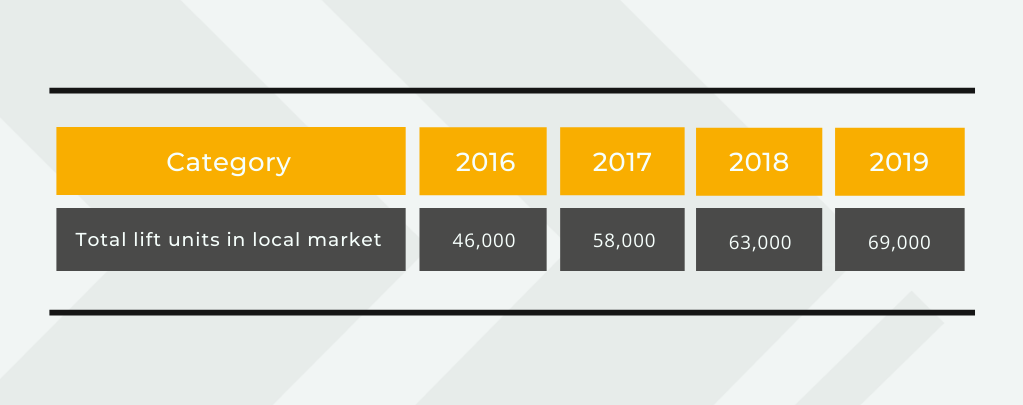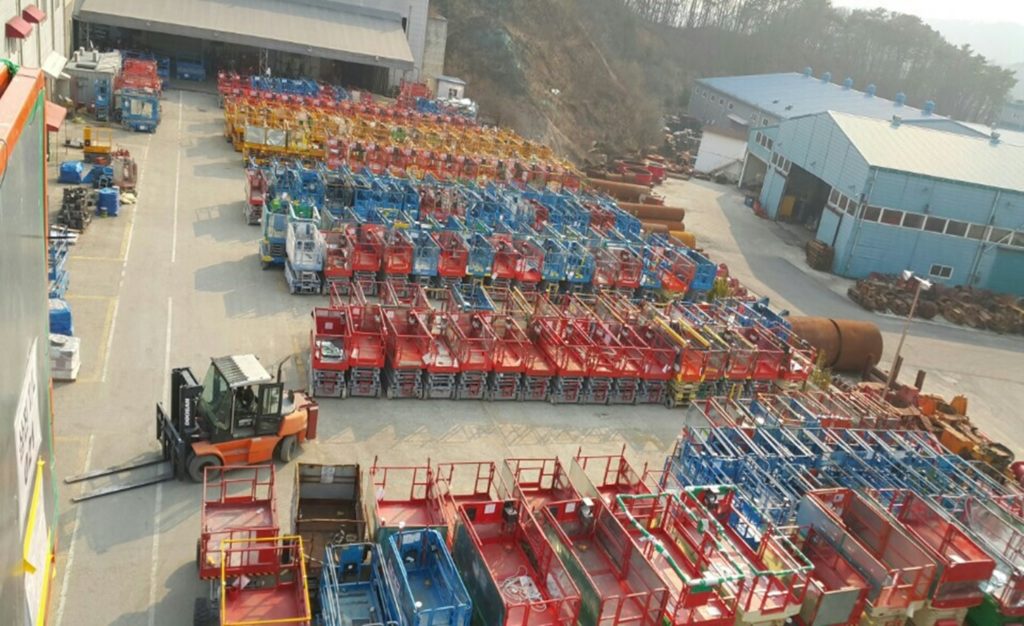AJ Networks operates AWP rental business in South Korea, the US and Middle East Asia. It is the No. 1 rental company in the Korean market. Founded in February 2000, AJ Rental has three business areas – IT devices, pallet & logistics equipment, and construction equipment. The company boasts an efficient nationwide network with the largest amount or rental equipment in Korea, including 12,000 units of aerial equipments, 6,000 forklifts, and lighting towers. Also, 360,000 units of equipment related to the IT device.
Jin Su Jeon accepted to give Haulotte an interview, in which he told us the Korean market.
How is the rental market for lifting equipment in Korea?
Korea’s lift market is centered on scissors. Some limited numbers of booms specifically for use in shipyards are rented out, yet due to the economic recession of ship making industry, the recent demand has decreased. Korea is seeing a majority of truck mounted booms in the market due to its capacity to travel on roads. AJ is the number one local company with the truck mounted booms and conducts sales around this. This equipment requires a dedicated operator and incurs a high rental unit price. AJ is reviewing possibilities of supplementing this by increasing booms and is continuing to pioneer the boom-only specialized market.

Korea sees overall heightened safety regulations. So first-grade conglomerate construction companies are increasing demand for safety options. Rental companies are expecting to see an increase in product costs.
They will change regulations recommended by the manufacturer based on KS certification. Rental companies also need to keep their equipment in good condition accordingly. Customers should also use the equipment recommended by the manufacturer and rental company. We plan to conduct training for our customers, and the Korean government is also keeping a close eye on the safe use of equipment.
Lifting equipment safety regulations are more important as workers are on board and work at height. General limitations are similar to those used in the United States or Europe. All AWP equipment in Korea must be KC-certified. Legally, rental companies and users must maintain their status when they receive KC certification. This part is going to be strengthened in the future
How has the health crisis of 2020 impacted your activities and your suppliers' relationship?
The existing sites are kept operating, But the new locations are delayed. The 40% to 50% significant sites start next quarter.
Korean construction sites are usually maintained with foreign workers’ labor (of Chinese and other descent). Earlier, they were exposed to the risk of COVID 19 contagion and actual confirmed cases, which led to full site closures that delayed or canceled the whole construction process, hindering sales growth. However, in the latter half of 2020, Korea successfully curbed the spread, allowing the restart of halted construction projects and the opening of new sites. We expect sound/substantial growth in the local rental market in 2021.
Precisely how would you describe your relationship with Haulotte?
Since the 2015 deal, we have maintained a good partnership with Haulotte. Recently, we have purchased various additional models. The supply of new equipment is essential because only the equipment can be operated within five years at major construction sites such as Samsung and SK. Haulotte is one of the major manufacturers, and we expect its market share to increase in the future. Haulotte products were introduced when AJ purchased some 400 units, mainly smaller equipment, for the first time. Recently we plan to train and deploy big booms for the first time. Once its practical on-site use is confirmed, we plan to purchase more units.
How do you think the rental and elevation market will evolve?
It has grown about 5 percent every year over the past two years. Major customers such as Samsung and SK announced large-scale investments this year and next year. Microchip construction sites use the equipment for at least two years. It also plans to make a new investment because only young equipment produced within five units can be used. It is expected to grow by 10% every year over the next two years. Of course, it is subject to change depending on the Covid 19 situation.

What is your vision for the upcoming years ?
In 2003, Korea’s AWP market was only 3,000 units. It has developed slowly until 2015. We call this period the introduction period. From 2016 to 2018, the size of the market has exploded. I expect that there will be an era of maturity in the future. Therefore, strengthening safe equipment use education, expanding the Boom equipment market (Korea’s Boom equipment market is tiny). Most use truck-mounted booms, introducing special equipment such as Spider Lift is our challenge. From 2016 to 2018, Major Rental companies had purchased about 2,000 units of equipment per year. As the new equipment’s unit price was not much different from used equipment due to the big deal, we bought an only new machines. After 2019, major Rental companies are still accepting new equipment, but small Rental companies are buying used equipment from major Rental companies. It is difficult for large rental companies to purchase used equipment because only equipment under the age of five can be operated at major construction sites such as Samsung’s microchip site and SK’s
microchip site. These large sites use more than 25 percent of the equipment in Korea. Therefore, the relationship between suppliers and rental companies is significant. By introducing various types of AWPs, we can increase the size of the Korean market.
Due to the semiconductor market preference, only new equipment is deployed to sites. Once a site is completed, the equipment is evaluated to determine reuse in semiconductor fields and overgo separate maintenance and storage systems. Those that don’t meet the criteria are redeployed to construction sites for available homes and offices where there are no limitations in product lifetimes. AJ has seven maintenance facilities across the country with 100 maintenance professionals to keep used equipment in the best conditions throughout its lifetime – when in use and also in storage. Equipment exceeding ten years of service are sold to smaller local rental agencies or sold overseas through brokering agencies, while some units are used in AJ foreign offices.